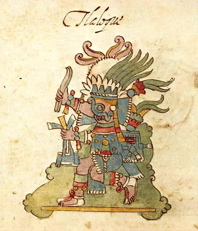
While Yale’s offerings in Spanish and Portuguese are well-known, the Council on Latin American and Iberian Studies also promotes the learning of lesser known languages of Latin America, most notably with their flourishing Nahuatl language program. Nahuatl, commonly recognized as the language of the Aztecs, is spoken today by 1.5 million people in Mexico. In 2007, CLAIS formed a consortium with NYU and Columbia to strengthen the instruction of Less Commonly Taught Languages, such as Nahuatl. The consortium focuses on identifying and training qualified native-language instructors, developing appropriate curricula and teaching materials, and making effective use of technology in pedagogy. In close collaboration with the Center for Language Study at Yale, the consortium ran a pilot program for Nahuatl in conjunction with IDIEZ (the Zacatecas Institute for Teaching and Research in Ethnology) in 2008-2009, through which Yale students utilized Elluminate distance learning technology to study Nahuatl as taught by John Sullivan in Zacatecas, Mexico. The program was so successful that it was opened to students at NYU and Colombia in 2009-10.
The increasing popularity of Nahuatl is further demonstrated by the growth of Yale’s intensive summer course in Zacatecas. Enrollment in the six-week program has increased from 5 students in 2005 to 22 students in 2010, and the program has attracted undergraduate and graduate students from across the U.S. (and Canada), in such diverse fields as anthropology, history, and linguistics. Alumni of the program have found creative ways to continue their Nahuatl studies, from reviewing Nahuatl lessons posted on Twitter and Facebook, to teaching the language on their home campuses. Students have even made a video for YouTube and published a poem in Nahuatl.
News of Yale’s Nahuatl program has begun to spread across the nation, as the 2010 convention of the Pacific Coast Council on Latin American Studies will feature two program alumni and instructor John Sullivan on a panel dedicated to distance learning models for teaching Nahuatl. Yale itself is set to host a weekend workshop in spring 2011 on the state of Nahuatl instruction in the United States, in which students and scholars of Nahuatl may assess the strengths and weaknesses of current programs and collaborate on new Nahuatl language projects. All signs point to a growing interest in the language of the Aztecs, and if the past proves to be any indication, Yale will be at the forefront of the Nahuatl pedagogy movement, ready to greet any and all students with a sincere “Piyali.”
